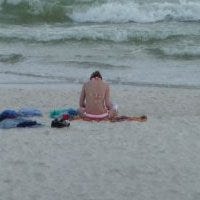April 20, 2011

 For the past several years, sometime between late April and early May, my friends and I have trekked to L.A. for sun, sand, surf, good times, great music, and a much-needed break from Colorado’s bipolar springtime weather. Nope, not talking about Los Angeles here—to us, L.A. stands for Lower Alabama, home to sugar-sand beaches, perfect-for-kite-flying breezes, affordable waterfront rentals bedecked in kitschy seashell art, and a laid-back vibe that transplants you to those heady pre-cell phone days.
For the past several years, sometime between late April and early May, my friends and I have trekked to L.A. for sun, sand, surf, good times, great music, and a much-needed break from Colorado’s bipolar springtime weather. Nope, not talking about Los Angeles here—to us, L.A. stands for Lower Alabama, home to sugar-sand beaches, perfect-for-kite-flying breezes, affordable waterfront rentals bedecked in kitschy seashell art, and a laid-back vibe that transplants you to those heady pre-cell phone days.
This vacation, this pristine environment, this annual opportunity to relax, recharge, and regain clarity had almost become expected, a so-to-speak scheduled unplugging from our otherwise crazy-hectic worlds of work, family and relationships. I dare say I’d begun to take this trip for granted.
But all that changed last April, when just a few short weeks before our departure date—one year ago today, to be precise—a certain oil-drilling rig exploded in the Gulf of Mexico, causing a gazillion gallons of oil to spew from the sea floor.
I remember vividly the sucker-punch to the gut I’d felt when news of the spill first broke—and not because my impending beach frolic now hung in the balance. What sickened and scared me most was the absolute unknown—what impacts this snafu might have for years, decades, even generations to come. Regardless of whether oil started lapping ashore within days or this geyser would be capped immediately and kids could carry on sculpting sandcastles without care, environmental interruptions of this magnitude never fizzle out quietly. Ecosystems, food chains, climate—everything is subject to impact.
And then I thought of the Gulf economy, dependent on fishing and even more so on tourism. I thought of the bartenders at the infamous border-straddling Flora-Bama watering hole, the myriad surf shop owners, Waffle House waitresses, condo owners, real estate agents, concert promoters, fishing guides, marina managers—all having their livelihoods slashed because suddenly no one sought their space or services.
By the time our vacation finally rolled around, we’d all been glued to the news and to Google Earth maps overlaid with spill data for the past few weeks. And it appeared that, for our purposes, our trip would be entirely safe to execute as planned. In fact, few if any visible signs of spillage had surfaced in the greater L.A. area. I’d even checked into volunteer clean-up opportunities, hoping to channel my unrest about the situation into positive action, but at that early stage in the crisis, officials were asking tourists to not get involved and to leave the project to trained professionals. So there was little to do but dance in the sand and play paddleball as planned.
Still, when we arrived, it felt almost creepy to know such craziness ensued out there in the Gulf yet we could see none of its impacts with the naked eye. I felt guilty for digging my toes in the sand, knowing that that very spot could become blackened and sticky after a slight wind shift or storm. It seemed there were fewer birds padding along the water’s edge and scrounging for grub than in previous years, but that could’ve been fear and paranoia clouding my memory.
Of course, we ended up having the vacation of a lifetime, bolstered by all of the things we had come for—friends, family, music, sunshine, clarity. But honestly, I believe that the beauty of each of those elements was intensified by the knowledge, or should I say the reminder, that our environment, our planet as we know it, is fragile, not to be abused, and never to be taken for granted.
About the Author(s)
You May Also Like




